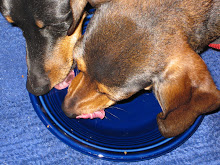You might remember early on in the days of this blog (I say as if this blog is really really old) I designated a space for books. It is a list of links to books which have to do with food, usually vegetarian or vegan food, that I find fabulous in some way or another. Not only was I going to list those books, but "review" them within the blog as well.
I haven't done that much.
It isn't so much that I have forgotten about that feature, but that I am a little intimated by the idea of reviewing this next book. I could always choose another book first, but why go on any longer? I'll have to do it sooner or later.
The Face on Your Plate by Jeffrey Moussaieff Masson is the book that launched me into a dairy-free, humane-egg-only lifestyle. Most of the people I know won't even touch this book simply because of its title. I read the title now and it's quite clear, this is a book that will tear into every detail about your diet and make you feel guilty about it. For G-d's sake, just look at the word face.
I originally picked up this book and read the jacket thinking it would be an exploration into the psychology of why people eat what they eat. Cool. I'd like to know that considering I am so profoundly effected emotionally that I can't eat certain things (and thus this blog).
Not so much.
Moussaieff Masson digs into the food industry, into the psychology of eaters, into cultural dining, into the economics of food, and into the environmental effects of the way we eat. He didn't leave many corners unexplored and he tied many of these elements together. The Face on Your Plate is a good go-to book for any information you may want on the food industry, unless you'd like to keep eating flesh without a guilty conscience.
That last part is unfortunate in my opinion. So much of that information is invaluable and could be used to help make healthier, cleanier, safer farms and an Earth on the way to improvement instead of in a constant downward spiral of damage and global warming. But what omnivore wants to read about how cows, chickens, and fish are treated pre-plate? Or about their negative carbon foot print?
Prior to reading this book I always thought I was doing my part by not eating meat and that dairy and eggs were okay because no animal was being killed. I laugh at that now because cruelty does not equal death. And as I read those sections of the book, I wanted to kick myself because it all seemed so obvious. I'm not giving specifics because some of my readers won't want to know them. I am going to respect that. At the same time, I am going to encourage everyone to read this book. I have a sneaking suspicion it is very under-read.
To address what I know some people are thinking:
*No, this is not the only book from which I've gotten my information. After reading these menu-altering chapters, I picked up other books and joined online groups. I asked many questions, researched, and confirmed what I originally read.
Subscribe to:
Post Comments (Atom)

I don't know. I like the negative parts. I think a big part of vegetarianism, veganism, healthier food choices or good environmental stewardship is being aware of what we're doing and where our foods/materials/conveniences come from. I think awareness really is the issue with a lot of people. They (and by "they" I at least partially mean a me-including "we," since I'm a sometime conscious eater, occasional vegetarian, but only sometimes) are too used to what they do, too acclimated to thinking of it as normal. Maybe people need to get over their squeamishness (one part where I usually don't include "me"). Maybe we need to get un-used to some habits. Maybe the person who's unconcerned about cruelty (because he or she doesn't rank animals as high or whatever) will be concerned about a negative carbon footprint. Or maybe someone who hasn't invested the intellectual energy to learn about carbon footprints will be moved by the cruelty.
ReplyDeleteAnyway, I'm probably talking out of my ass, especially since I struggle to live up to what I preach as much as the next person. I just tend to think more awareness is almost always good. Even the sad stuff. Especially the sad stuff.
You're not talking out of your ass at all. Being aware is also step one. Step Two is taking action. I know a few people who are fully aware of the cruelties and carbon footprints of their ways, but haven't changed any habits. Changing can be harder than learning.
ReplyDeleteYeah; definitely. I just mean that maybe it's not so unfortunate that people get to/have to read about the pre-plate treatment of their food, or the environmental impact of their lifestyles. I know some people who are "aware," more or less, of the cruelty and impact of their lifestyles, but, you know, not really. Like the poultry industry. I was always kind of nebulously aware that it wasn't good, but then I saw a video -- and it was horrific -- and it was like, DANG. It makes it hit home, you know? Seems like that would help bring real change.
ReplyDeleteI guess there are limits. But I like limit pushers.